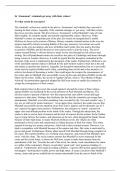In ‘Atonement’, criminals get away with their crimes’.
To what extent do you agree?
The criminals’ actions are central to the plot in ‘Atonement’ and whether they succeed in
atoning for their crimes. Arguably, if the criminal manages to ‘get away’ with their crimes,
they have not truly atoned. The first crime in ‘Atonement’ is Paul Marshall’s rape of Lola.
Most notably, he commits legally and morally reprehensible crimes. However, whilst
Marshall’s crimes are important part of the plot, his crimes are marginalised to enable
McEwan to focus on the actions of Briony. Briony commits criminal actions in the way she
perjures herself by falsely accusing Robbie of the rape; moreover, her actions are social
crimes in the way she destroys the lives of Robbie and Cecilia. Her lies lead to the false
accusation of Robbie and his decision to leave prison early to join the army. The novel
centres around Briony’s obvious desire to atone for her sins through her life choices and
writing. Her self-punishment means she sacrifices her place at Cambridge and atones through
being a nurse in London. However, it could be argued that her deception committed in the
first part of the novel is replicated in her deception of the reader. Furthermore, McEwan’s use
of the unreliable narrator makes it difficult for the post-modern reader to trust her at the end
and makes us question her motives. Arguably, her deception immortalises her as a successful
writer and she exploits Robbie and Cecilia, controlling them in life and in her narrative, to
achieve her dream of becoming a writer. One could argue she escapes the consequences of
her crime, akin to Marshall who successfully covers up his rape and allows Robbie to take the
blame for his crime. Unlike, the novels of Agatha Christie, such as ‘The Murder of Roger
Ackroyd’ the postmodern approach adopted by McEwan seems to enable the criminal to
escape the consequences of their crimes.
Both central crimes in the novel, the assault against Lola and the crime of false witness
against Robbie are facilitated by the social positions of Paul Marshall and Briony. The
novelist seems to present a Marxist view that exposes that class allows social and legal
injustices to take place. Perhaps, this facilitates the fact that the criminals can escape their
punishments. Marshall, even after assaulting Lola, revealed by the ‘two-inch scratch’ says, ‘I
say, are we still on for tennis tomorrow’. As an upper class construct, the reader can see that
Marshall successfully diverts attention away from Lola’s injuries and his idiomatic use of ‘I
say’ exposes his upper class position. Furthermore, the reference to ‘tennis’ cements his
upper class and affluent position in the mind of the reader. Through his interjection, the
reader is able to see his lack of remorse and his lack of concern for his actions. In the Golden
Age of crime fiction, the readers, and characters in the text, often disregard the family friend
because of their high status. In many Sherlock Holmes novels, the villains are often
positioned as lower class and constructed as villains because of their low status. This often
equated to having less money and power, which led to their criminal actions. However, it is
hard to sympathise with Marshall because of his empire and class. His crime is motivated by
power and greed. Furthermore, Briony allies herself with Marshall through being complicit in
his crime. She exploits Robbie, as a working-class character, and ensures that Marshall ‘gets
away’ with his crime. The social context ensures that Marshall is never suspected for the
crime and his social status, as shown by McEwan, seems to make him immune from the
punishment of the law. Towards the end of the novel, his charity work consolidates his status
as a pillar of the community. Briony reveals their ‘good work’ and ‘generous funding of …
projects’. Furthermore, they made according to Briony, ‘vigorous libel action against national
newspapers’ showing their wealth, power and high status. It seems conclusive that Marshall’s
money, status and power enabled him to remain untouchable from the start to finish of the




